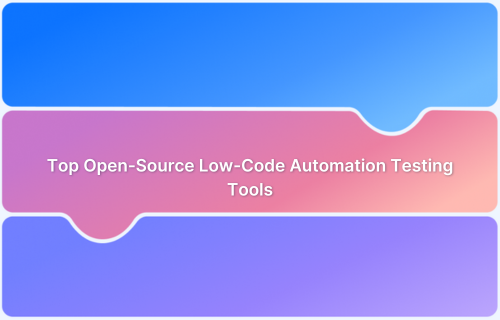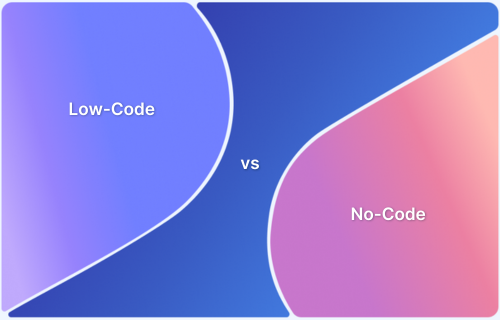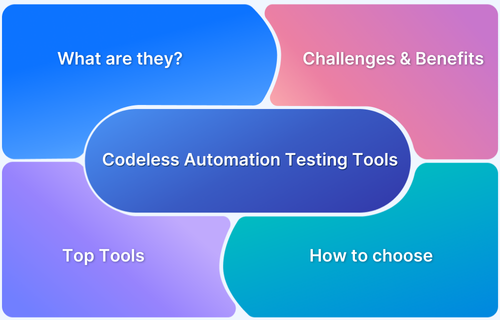testRigor is an AI-driven, codeless test automation platform that simplifies the process of creating, executing, and maintaining automated tests.
While testRigor is an effective solution for many teams, some organizations may seek alternatives based on specific requirements or limitations of the platform.
Overview
Top testRigor Alternatives:
- BrowserStack Low-Code Automation: AI-powered self-healing with real-device testing for web and mobile.
- Appsmith: Open-source low-code platform for internal tools.
- Leapwork: Visual flow-based test automation for web, desktop, and enterprise.
- Reflect.run: No-code browser testing with interactive recording.
- Xano: Scalable no-code backend and API builder.
- Rainforest QA: Cloud-based no-code testing with AI stabilization.
- Studio Creatio: AI-augmented no-code platform for workflows and CRM.
- Mendix: Low-code enterprise platform for apps across web, mobile, IoT.
- Virtuoso QA: Natural language-driven test automation for web apps.
- UI Bakery: Drag-and-drop platform for custom internal apps and dashboards.
- Functionize: AI-powered codeless testing with cloud execution.
- Appian: Enterprise automation and case management with low-code/no-code.
This article explores the key features of testRigor, outlines why alternatives might be considered, and highlights the best alternatives for teams seeking flexibility, scalability, and more cost-effective solutions in test automation.
What is testRigor?
testRigor is an AI-powered test automation platform that enables users to create, execute, and maintain tests using plain English. Its machine learning identifies UI elements like humans do, eliminating fragile selectors and reducing maintenance.
Seamless CI/CD and test management integrations make it ideal for continuous testing in agile workflows.
Key Features / Use Cases:
- Tests can be written using simple, human-readable language without requiring coding skills, making the tool accessible to both technical and non-technical users.
- testRigor automatically adjusts tests when there are changes in the UI, ensuring long-term test stability even across frequent application updates.
- Supports testing for web, mobile (hybrid/native), API, and desktop applications, making it adaptable to a wide range of use cases.
- testRigor seamlessly integrates with popular CI/CD pipelines and test management tools, enabling continuous and automated testing in fast-paced development cycle.
Why Consider testRigor Alternatives?
While testRigor is an excellent tool for many teams, there are several reasons why some organizations might seek alternatives:
- Pricing: Some of the more advanced features in testRigor, like desktop app testing, require paid plans, which may be too costly for smaller teams or startups.
- Learning Curve for Complex Test Scenarios: Although testRigor is designed to be accessible, more complex or custom scenarios may still require some manual adjustment or additional expertise.
- Customization Limitations: While the platform excels in ease of use, highly dynamic UI elements or non-form-based workflows might require manual adjustments, limiting its effectiveness in certain testing environments.
- Limited Focus on Game Testing: testRigor is not designed for game testing, so teams working on gaming applications might require a more specialized testing tool.
testRigor: Quick Overview
Several platforms provide capabilities similar to or beyond testRigor. The table below highlights their pros and cons for easy comparison.
| Tool | Pros | Cons | Free Plan |
|---|---|---|---|
| BrowserStack Low-Code Automation | AI-powered self-healing, real-device testing, low-code authoring | Advanced features require paid plans | ✅ Free plan for unlimited test creation |
| Appsmith | Open source, flexible deployment, strong security options | Slower on complex/data-heavy apps, some features paid | ✅ Up to 5 users |
| Leapwork | Visual flow-based automation, cross-platform, beginner-friendly | Setup complexity for CI/CD, advanced use may need vendor support | ❌ |
| Reflect.run | No-code browser test automation, fast setup, hosted infra | Web-only support, costs rise with usage | ❌ |
| Xano | Rapid backend/API prototyping, highly scalable | Backend only, advanced features need expertise | ✅ Starter plan |
| Rainforest QA | Easy no-code test authoring, AI-stabilized, parallel tests | Limited to web apps, pricing grows with large suites | ❌ |
| Studio Creatio | AI-powered workflow and CRM automation, enterprise-ready | Higher tiers for advanced features, no free plan | ❌ |
| Mendix | Collaboration across teams, large template marketplace | Steep learning curve, expensive at enterprise scale | ✅ Free tier (basic) |
| Virtuoso QA | Natural-language authoring, AI-driven element discovery | Limited advanced scripting, no desktop/mobile support | ❌ |
| UI Bakery | Fast app building, flexible data integrations, customizable UI | Limited mobile support, advanced coding has learning curve | ✅ |
| Functionize | AI-driven test generation, Chrome plugin, scalable infra | Web-only focus, advanced features locked in higher plans | ❌ |
| Appian | Enterprise automation, strong governance & compliance | Expensive, steep learning curve for business users | ❌ |
Top 12 TestRigor Alternatives
Below are the leading platforms teams often compare with TestRigor. Each tool provides distinct strengths to meet different testing and development needs.
1. BrowserStack Low-Code Automation
BrowserStack Low-Code Automation empowers teams to create, run, and maintain automated tests without writing code.
It combines an interactive test recorder, AI-powered self-healing, and real device cloud testing so teams can begin testing and start automation in minutes and scale across browsers and devices.
With AI-powered self-healing and low-code authoring agents, it speeds up test creation by up to 10x and reduces build failures by up to 40%, delivering faster, more stable automation for both technical and non-technical users.
Key Features of BrowserStack Low-Code Automation:
- Test Recorder: Easily capture user actions like clicks and form inputs and transform them into automated tests. This recorder supports complex functional validations including visual and text validations.
- Readable Test Steps: Actions recorded are converted into simple, human-readable English instructions, making it easy for anyone to understand and modify tests.
- Visual Validation: Enables testers to add checkpoints during recording that verify the correct display of UI components or screens, ensuring that visual elements render as expected.
- AI-Powered Self-Healing: Uses AI to detect when UI elements change and automatically updates the test to prevent failures. This minimizes the need for manual test maintenance.
- Low-Code Authoring Agent: Uses AI to turn natural language prompts into executable test steps, automating tasks from simple instructions.
- Cross-Browser & Mobile Testing: Runs tests on real desktop browsers and mobile devices in the BrowserStack cloud, covering a wide range of operating systems and devices.
- Data-Driven Testing: Allows the same test to be executed with different input values, enabling broader coverage of scenarios without creating separate tests.
- Reusable Modules:Lets teams save common sequences of steps as reusable modules that can be inserted into multiple test cases, reducing duplication and simplifying maintenance.
- API Step Integration: Adds flexibility by letting testers call APIs from within the test for tasks such as generating data, setting up test conditions, or cleaning up databases.
- Test Scheduling and CI/CD Integration: Enables automated tests to run on a set schedule or trigger directly from build pipelines via REST APIs or popular CI tools, ensuring continuous validation without manual intervention.
- Test Editing Without Re-Recording: Allows testers to open an existing test and modify, insert, or delete steps without having to re-record the whole test, saving time during maintenance.
- Private Environment Testing & Email Notifications: Teams can test websites behind firewalls or on internal and staging environments with zero setup. It also sends detailed email reports with build pass/fail status and logs, giving stakeholders timely insights while validating applications securely.
Pricing:
- Free Plan: Offers unlimited test creation along with AI-generated test data, intelligent wait handling, API steps, secure private environment testing, video debugging, and 24×7 support.
- Paid Plan: Unlocks AI agents, advanced self-healing, parallel execution, and enterprise-grade features, with custom pricing based on organizational needs.
Get Started with BrowserStack Low Code Automation for Free
2. Appsmith
Appsmith is an open-source low-code platform that helps teams quickly build internal tools using drag-and-drop UI elements, API connectivity, and Git-based version control.
Key Features
- Extensive widget library with built-in database integrations
- JavaScript support with in-platform IDE
- Git integration for version control and CI/CD
Pros
- Open-source with flexible deployment options
- Strong security features like role-based access and SSO
Cons
- Can lag with data-heavy or complex pages
- Advanced functions often require paid plans
Pricing: Free for up to 5 users. Business plan $15/user/month. Enterprise pricing available on request.
3. Leapwork
Leapwork is a no-code automation platform with a visual, flowchart-based interface, making it easier for teams to create tests without technical expertise.
Key Features
- Flowchart-style test builder with drag-and-drop
- AI-driven, self-healing tests
- Real-time analytics and dashboards
Pros
- Beginner-friendly for QA teams and business users
- Ideal for regression and end-to-end test automation
Cons
- Some functions may need vendor training
- Infrastructure setup may be required for CI/CD
Pricing: Custom pricing on request.
Read More: What is End To End Testing?
4. Reflect.run
Reflect offers a no-code testing solution that records browser activity to create automated workflows, enabling both technical and non-technical team members to contribute.
Key Features
- Interactive browser-based test authoring
- Auto-generated selectors to reduce test flakiness
- Native CI/CD integrations with logs and video capture
Pros
- Easy test creation and maintenance
- Cloud-hosted platform with detailed reporting
Cons
- Primarily supports web testing
- Pricing can scale up with heavy usage
Pricing: 14-day free trial; paid plans begin at $212/month.
5. Xano
Xano provides a no-code backend platform to build APIs and workflows that connect to any front-end or enterprise system.
Key Features
- Visual workflow builder for backend logic
- PostgreSQL-based database
- API creation for REST, GraphQL, and webhooks
Pros
- Rapid backend prototyping and deployment
- Scales effectively with modern infrastructure
Cons
- No built-in frontend tools
- Advanced use cases may need technical skills
Pricing: Free plan available. Paid plans start at $25/month; Pro plan from $224/month. Enterprise pricing available.
6. Rainforest QA
Rainforest QA delivers cloud-hosted no-code web testing with parallel execution and AI-powered test stability.
Key Features
- Visual test creation without code
- AI-supported self-healing scripts
- Cloud-based parallel execution
Pros
- Quick setup for non-technical users
- Includes infrastructure for testing and management
Cons
- Web-only focus with limited desktop/mobile support
- High usage can lead to rising costs
Pricing: Custom pricing.
Learn More: Comprehensive Guide to Low-Code Development
7. Studio Creatio
Studio Creatio is an enterprise-focused no-code platform enhanced with AI, enabling workflow, data, and CRM automation.
Key Features
- Drag-and-drop builder for workflows and integrations
- AI-powered app and UI generation
- Prebuilt templates for business processes
Pros
- Empowers non-technical contributors with AI tools
- Designed for scalable enterprise automation
Cons
- Advanced features require higher pricing tiers
- Limited mobile support
Pricing: Starts at $25/user/month, no free plan.
8. Mendix
Mendix is a low-code platform for enterprise-grade app development across web, mobile, and IoT with AI-driven assistance.
Key Features
- Model-driven IDE for workflows, UI, and data
- Built-in DevOps and agile collaboration tools
- Supports public, private, and on-premises deployment
Pros
- Encourages collaboration across IT and business teams
- Large marketplace with reusable templates and components
Cons
- Learning curve for advanced customization
- Costs rise quickly for enterprise use
Pricing: Free tier with limited features. Standard pricing starts at €900/month.
9. Virtuoso QA
Virtuoso is a cloud-first, AI-powered platform for low-code/no-code web testing using natural language instructions.
Key Features
- Natural language test scripting
- AI-based element recognition and self-healing
- Parallel execution across browsers and devices
Pros
- Extremely beginner-friendly with plain-English authoring
- Precise, stable automation across environments
Cons
- No support for desktop or mobile native apps
- Limited flexibility for complex scripting
Pricing: Custom pricing.
10. UI Bakery
UI Bakery is a low-code/no-code builder for internal apps and dashboards, designed with strong data connectivity and UI customization.
Key Features
- 100+ prebuilt, customizable UI components
- Connects with SQL, NoSQL, REST APIs, and third-party tools
- Visual workflow editor with branding options
- Custom logic via SQL, Python, or JavaScript
Pros
- Rapid app creation and deployment
- Strong data integration capabilities
Cons
- Requires effort to use advanced coding features
- Limited native mobile app support
Pricing: Free plan available. Paid plans from $5/user/month or $10/developer/month.
11. Functionize
Functionize leverages AI to deliver codeless web testing with Chrome-based recording and cloud execution.
Key Features
- AI-driven test creation and healing
- Chrome plugin for quick recording
- Scalable cloud-based execution
Pros
- Easy adoption for non-technical teams
- Reliable test stability from AI automation
Cons
- Best suited for web apps only
- Higher features reserved for premium plans
Pricing: Custom pricing.
12. Appian
Appian is a hybrid low-code and no-code enterprise platform designed for workflow automation and case management.
Key Features
- Process modeling and orchestration tools
- AI/ML-driven analytics
- Integrates with ERP, CRM, and legacy systems
Pros
- Scalable for enterprise-grade automation
- Strong compliance and governance features
Cons
- Pricing is enterprise-only and typically expensive
- Not as user-friendly for beginners
Pricing: Custom, quote-based.
Also Read: 13 Open Source AI Testing Tools
Why Choose BrowserStack Low-Code Automation?
BrowserStack Low-Code Automation is a leading alternative for teams seeking a flexible, scalable, and reliable test automation solution. Key advantages include:
- Real-Device Testing: Runs automated tests on real desktop browsers and mobile devices, providing accurate results under real-world conditions.
- AI-Powered Self-Healing: Automatically adapts tests to UI changes, reducing maintenance and ensuring stable test execution.
- Low-Code Accessibility: Enables both technical and non-technical users to create, modify, and execute automated tests with minimal effort.
- Cross-Platform Coverage: Supports web and mobile applications across a wide range of operating systems and browsers.
- CI/CD Integration: Seamlessly integrates with existing CI/CD pipelines, enabling continuous testing and faster feedback loops.
- Scalable and Cost-Effective: Offers free plans and flexible pricing, allowing teams to scale without excessive infrastructure or subscription costs.
Conclusion
While testRigor provides strong AI-powered, codeless automation capabilities, some teams may face limitations with pricing, platform support, or complex custom scenarios.
BrowserStack Low-Code Automation offers a flexible alternative with real-device testing, AI-powered self-healing, low-code accessibility, and cross-platform coverage.
Its robust CI/CD integration and scalable pricing make it a reliable solution for teams of all sizes, ensuring faster, more stable, and cost-effective automated testing.








